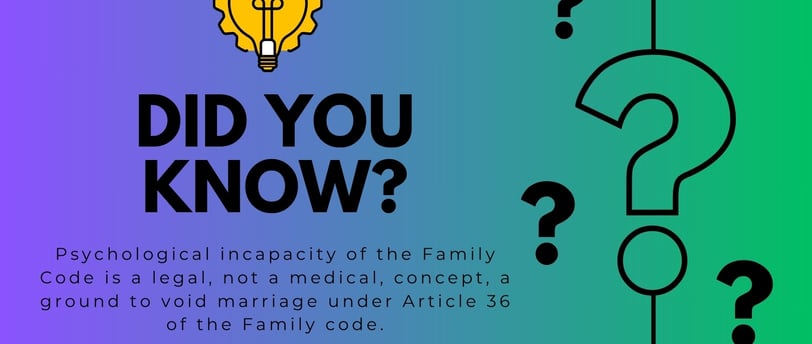When Marriage Crumbles Under "Psychological Incapacity"
Psychological incapacity of the Family Code is a legal, not a medical, concept, a ground to void marriage under Article 36 of the Family code.
5/31/20253 min read


Marriage is a profound commitment, and its dissolution is rarely easy. In the Philippines, one of the grounds for declaring a marriage null and void is "psychological incapacity" under Article 36 of the Family Code. But what exactly does that mean? A recent Supreme Court decision sheds light on this often-misunderstood legal concept, emphasizing that it's about a person's enduring inability to fulfill marital obligations, not necessarily a specific medical diagnosis.
Visit the case of Irene Constantino Datu and Alfredo Fabian Datu, and how their story underscores this vital distinction.
The Case: A Marriage Undone by Belief and Dysfunction
Irene and Alfredo's marriage, celebrated in 1980, faced significant challenges. Alfredo, a former US Navy serviceman, had been discharged for medical and psychiatric reasons, specifically schizophrenia, even before they met. Their union, born somewhat out of circumstance, eventually strained under Alfredo's unique beliefs and behaviors.
Alfredo believed he was an emissary of God, a conviction that led him to refuse work, leave Irene, and even believe he could have multiple wives, akin to King Solomon. These deeply held delusions, coupled with his failure to provide financial support and observe marital fidelity, painted a picture of a marriage in severe disarray.
Irene, for her part, testified about Alfredo's materialistic accusations, his nagging, and her eventual separation from him due to his new partner. Notably, she admitted receiving a pension from the US Veterans Affairs Office due to Alfredo's schizophrenia – a detail that would prove significant.
The Courts Weigh In: Schizophrenia as a Manifestation, Not the Sole Cause
Alfredo filed for nullity of marriage, citing psychological incapacity. The Regional Trial Court (RTC) found in his favor, concluding that his schizophrenia, established through various expert opinions (including a clinical psychologist, Dr. Soriano, and US Veterans Affairs findings), rendered him psychologically incapacitated. The RTC stressed that Alfredo's delusions directly impacted his ability to fulfill essential marital obligations.
The Court of Appeals (CA) affirmed the RTC's decision, emphasizing that Irene herself acknowledged the link between Alfredo's schizophrenia and her pension.
The Supreme Court's Clarification: A Legal, Not Medical, Concept
Irene appealed to the Supreme Court, challenging the sufficiency of evidence regarding Alfredo's schizophrenia and arguing that the trial proceedings were flawed. However, the Supreme Court upheld the lower courts' findings, but with a critical clarification on the nature of psychological incapacity.
Citing the landmark case of Tan-Andal v. Andal, the High Court reiterated that psychological incapacity is a legal concept, not a medical illness. This means:
No specific psychological illness is required: While Alfredo's schizophrenia was well-documented and served as a clear manifestation, the Court emphasized that the presence of a formal medical diagnosis like schizophrenia isn't, by itself, the sole determinant.
Focus on the "Personality Structure": What matters is whether there's an "enduring aspect" of a person's personality, a "personality structure," that makes it genuinely impossible for them to understand and fulfill their essential marital obligations.
"Grave" Incapacity: This doesn't mean a dangerous mental illness, but rather that the incapacity is serious enough to exclude "mild characterological peculiarities, mood changes, [or] occasional emotional outbursts." It must stem from a "genuinely serious psychic cause."
Juridical Antecedence (Pre-existing): The incapacity must have existed at the time of the marriage, even if it only becomes apparent later.
Permanence (Relative to the Partner): The incapacity isn't necessarily "incurable" in a medical sense, but it is permanent in relation to that specific marital partner.
Alfredo's Incapacity: A Clear Case
In Alfredo's case, his deeply ingrained delusions – his belief in being God's emissary, his conviction that God ordered him to leave his wife and allowed him multiple wives, and his refusal to work – clearly demonstrated a severe and enduring inability to fulfill his marital duties of cohabitation, mutual love, respect, fidelity, and support. This wasn't a fleeting mood swing; it was a fundamental distortion of reality that directly undermined the foundation of their marriage.
The Court concluded that even if one were to disregard some of the specific medical documents, the psychological evaluation and Irene's own admissions about the pension tied to Alfredo's schizophrenia, provided sufficient evidence of his grave and enduring psychological incapacity
Disclaimer: This blog post provides general information and should not be considered legal advice. It is always best to consult with a qualified legal professional for specific situations and legal guidance.
